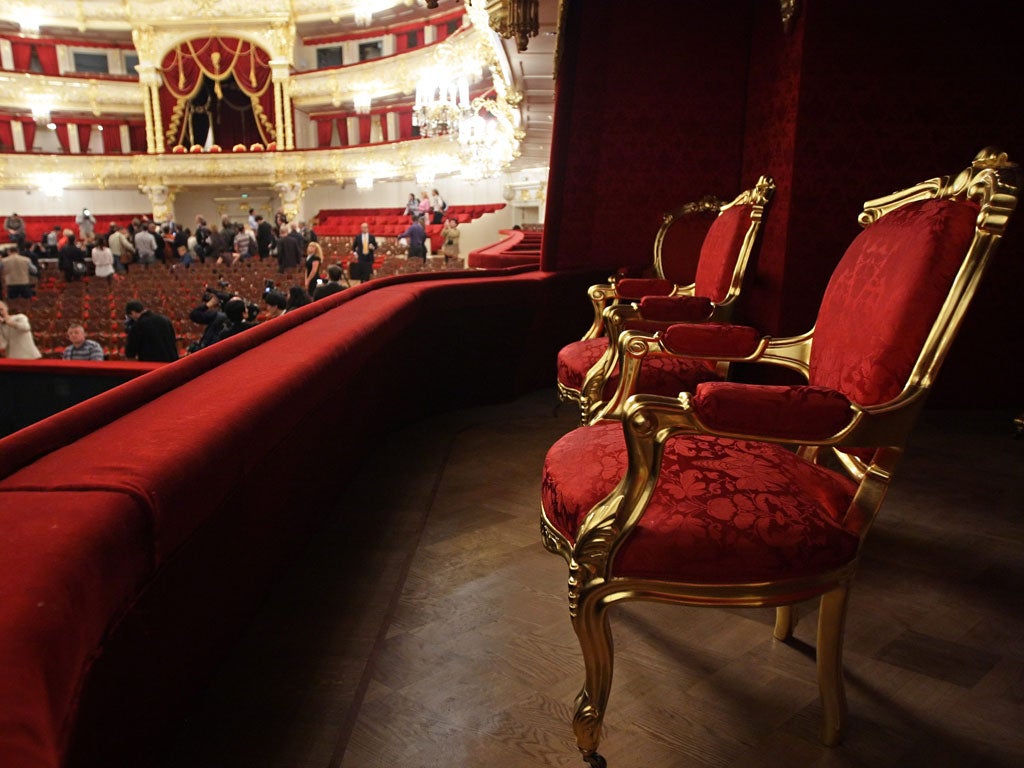Bolshoi's back after scandal-hit refurbishment
Opera house hopes to reclaim its top-venue status following eight-year facelift

Your support helps us to tell the story
From reproductive rights to climate change to Big Tech, The Independent is on the ground when the story is developing. Whether it's investigating the financials of Elon Musk's pro-Trump PAC or producing our latest documentary, 'The A Word', which shines a light on the American women fighting for reproductive rights, we know how important it is to parse out the facts from the messaging.
At such a critical moment in US history, we need reporters on the ground. Your donation allows us to keep sending journalists to speak to both sides of the story.
The Independent is trusted by Americans across the entire political spectrum. And unlike many other quality news outlets, we choose not to lock Americans out of our reporting and analysis with paywalls. We believe quality journalism should be available to everyone, paid for by those who can afford it.
Your support makes all the difference.Whether the tsarist double-headed eagle or the hammer and sickle has adorned its portico, Moscow's Bolshoi Theatre is uniquely symbolic of Russian national identity and pride. On Friday, after eight years of the most expensive opera house restoration in history, this two centuries old institution reopens with a lavish gala attended by President Medvedev, the German Chancellor, Angela Merkel, and a large swathe of Russia's elite.
Much of the 21bn rouble (£423m) reconstruction has been faithful to the original colonnaded interior, destroyed by fire in 1853. Silk embroidered tapestries return to grace the foyers while a two-ton crystal chandelier illuminates the auditorium's gilded boxes. The German companies Bosch Rexroth and Muller BBM have installed what the Bolshoi says is matchless backstage technology and acoustical engineering. But the project has been dogged by stoppages and delays, not to mention financial and other scandals.
A swamp was discovered underneath the foundations, along with 17 cracks running from the theatre's roof to the bowels. Investigation into massive embezzlement was launched this year after the designing company Kurortproekt was reportedly paid more than three times the agreed amount.
President Dimitry Medvedev himself stepped in, hiring Summa Capital, a huge investment group which has the controlling stake in the contractor. Things then moved at lightning pace, according to observers.
In one sense, the Bolshoi's well overdue modernisation should bring welcome relief for a company that, since the fall of Communism, has lurched from crisis to crisis. The Bolshoi relies on the state for 70 per cent of its expenditure. Two rounds of cuts to the cultural budget in 2008 chipped 27 per cent off its subsidy. That year's financial crisis hit hard, not to mention inflation.
By 2009 the company was averaging as little as one new production annually, most of its funding given to paying a bloated ensemble to appear in "reheated" productions of 31 operas per season and 38 ballets each year, some of them as old as the 1940s. International attention meanwhile focused on the rival Mariinsky Theatre in St Petersburg, which, under its omnipotent maestro Valery Gergiev, was turning out nine new stagings per season as well as lucrative international tours.
The Bolshoi has failed to engage someone with comparable charisma or talent. In 2009, the music director, Alexander Vedernikov, was pushed out; artistic differences were cited. The general director, Anatoly Iksanov, replaced him with a consortium of five conductors, an arrangement that lasted barely a year.
Stung by accusations of lack of transparency and what one former Bolshoi director called "a culture of laziness riddled with corruption", Iksanov culled the workforce and scaled down production costs. He then launched a young singers programme and hired Alexei Ratmansky as ballet chief. It made a difference. Ekaterina Scherbachenko, the Bolshoi's soprano, won the Cardiff Singer of the World competition in 2009 while, among the new ballet stars, Natalia Osipova and IvanVasiliev amazed audiences worldwide.
But the administration struggled to reform at the required pace. Ratmansky left prematurely, frustrated with the Bolshoi's byzantine politics. Anastasia Volochkova, a ballerina fired in 2003 for being overweight, complained that the 200-strong ballet company had become a quasi escort agency for its rich patrons. "Parties are organised for oligarchs," said Volochkova. "Girls are told, if you go to the party, you will have a future."
In March this year, the ballet director, Gennady Yanin, resigned after pictures of sexual encounters with other men were posted on the internet. Iksanov blamed "ambitious people within the theatre". Yanin said he was "tired" and had wanted to leave anyway.
The Bolshoi is experienced at weathering such storms. Its troubles do not appear to deter the high and mighty from wanting to be associated with the brand. On the board are some of the world's richest men: the telecom giant Konstantin Soludukhin, Alexander Zhukov, Victor Vekselberg (owner of the world's largest private collection of Fabergé eggs), and Oleg Deripaska, entertainer of British politicians on his yacht.
The Bolshoi's directors hope that these men will guarantee the future. But questions remain. One concern is that a place once accessible to all for a few kopeks will be an exclusive arena for high-spending tourists, Prada-wearing oligarchs' wives and their Kremlin friends.
Join our commenting forum
Join thought-provoking conversations, follow other Independent readers and see their replies
Comments